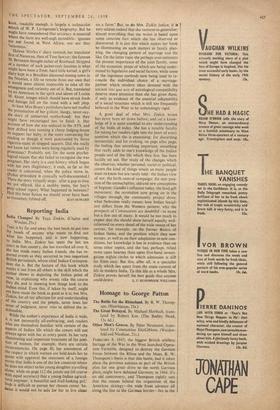Reporting India
India Changes! By Taya Zinkin. (Chatto and Windus, 25s.) Tits is by far and away the best book to put into the hands of anyone who wants to find out What has happened, and is now happening, to India. Mrs. Zinkin has spent the last ten Years in that country, she has travelled all over it, she has made many Indian friends, she has re- Ported events as they occurred to two important British periodicals, whose chief Indian Correspon- dent she is. But the feature of this book which marks it out from all others is the skill which the author shows in depicting the Indian point of view, in explaining why events take the .course they do, and in showing how things look to the Indian mind. Even this, if taken by itself, might not have made the book as good as it is; but Mrs. Zinkin, for all her affection for and understanding of the country and the people, never loses her sense of judgment, never tries to defend the in- defensible.
While the author's experience of India is wide, it is not necessarily all-embracing; and readers Who are themselves familiar with certain of the aspects of Indian life which she covers will not always agree with her at every point. In her very illuminating and important treatment of the posi- tion of women, for example, there are certain inconsistencies. On page 40, her assessment of the respect in which women are held, leads her to quote with approval the statement of a foreign envoy that India is one of the few countries where he does not object to his young daughter travelling alone; while on page 112 she points out (of course With equal accuracy) that a young Indian agricul- tural engineer, 'a beautiful and frail-looking girl,' finds it difficult to pursue her chosen career 'be- cause it would not be safe for her to live alone on a farm.' But, to do Mrs. Zinkin justice, it very seldom indeed that she ventures to generalise; almost everything that she writes is based upon some concrete fact which she has observed or discovered. It is just this which makes her book so illuminating on such matters a family plan- ning, the changing pattern of marriage and the like. On the latter topic she perhaps over-estimates the present importance of the joint family, some of the economic props of which are being under- mined by legislative and social factors; while some of the ingenious methods now being used to re- concile the individual choice of a marriage- partner which modern ideas demand with the ancient sine qua non of astrological compatibility deserve more attention than she has given them, if only as evidence of the essential adaptability of a social structure which is still too frequently believed in the West to be unbendingly rigid.
A great deal of what Mrs. Zinkin writes has never been set down before; and yet a know- ledge of it is quite essential to any understanding of the India of today. She has a notable faculty for taking her readers right into the heart of every question which she is examining; for discarding inessentials; and for evoking, on page after page, the feeling that something important, something that really adds to one's knowledge of the Indian people and of the life which they live, has been lucidly set out. Her study of the changes which she observes, whether personal, social or political, covers the kind of things which so many people want to know but are rarely told : the Indian view of sex; the birth control campaign; the new posi- tion of the untouchables; old and new conceptions of hygiene; Gandhi's influence today; the land-gift movement; the revolution now going on in the villages through,, the community project drive; what Nehruism really means; how Indian Social- ism differs from the Western pattern; why the prospects of Communism are doubtful—to name but a few out of many. It would be too much to expect that she should show herself equally well- informed on every detail of the wide sweep of her canvas; for example, on the former Fluters of Indian States, and the position which they now occupy, as well as on their adaptation to new con- ditions, her knowledge is less in evidence than on some other topics, and she has, perhaps, relied more upon hearsay than upon first-hand investi- gation within circles to which admission is silll far from easy. But this, after all, is a specialist study which lies apart from the main current of life in modern India. To this life as a whole Mrs. Zinkin proves herself the best guide that anyone could desire. L. F. RUSHBROOK WILLIAMS


































 Previous page
Previous page